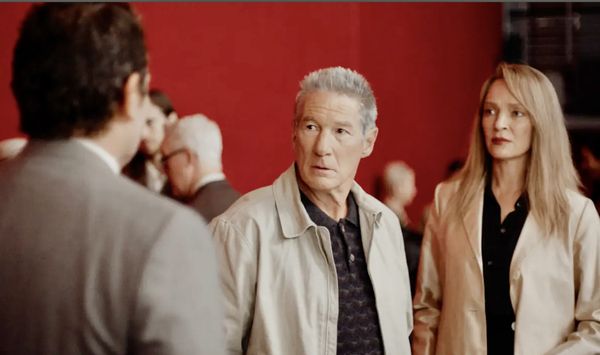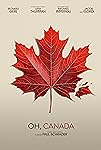Eye For Film >> Movies >> Oh Canada (2024) Film Review
Oh Canada
Reviewed by: Marko Stojiljkovic

The career path of Paul Schrader is an illustrative example of rise, fall from grace and redemption narrative structure. He established himself first as the talented scriptwriter, then as the potent filmmaker, enjoyed success during the Eighties and Nineties, after which he fell from the grace of Hollywood studios in the new millennium. The decade and half between Auto Focus (2002) and First Reformed (2017) was pretty tough for Schrader, as it was marked by disagreements with the producers, projects being taken away from him and re-cut and troubles financing his other films.
Almost miraculously, the filmmaker went back to his roots and re-emerged as the great auteur with his loosely connected (anti-)Calvinist trilogy consisting of First Reformed, The Card Counter (2021) and Master Gardener (2022). But after the underwhelming Oh Canada (premiered earlier this year at Cannes and caught at Sarajevo Film Festival where Schrader presided over the jury), one cannot help but wonder if the legendary New Hollywood is destined to fall once again.
Before proceeding to analyse the film’s shortcomings, there are some facts to be stated and some semi-educated guesses to be read as the background. Oh Canada is an adaptation of the late Russel Banks’ novel Foregone, Schrader’s second effort in adapting Banks after the acclaimed Affliction (1997). The writer and the filmmaker were friends, so the film is dedicated to the former. However, the novel itself is a tough nut to crack, given that it deals with the questions of impending death, legacy and fading or distorted memories, while it loses itself in digressions and unfinished narrative threads. Secondly, Schrader himself had a tough brush with Covid-19 in 2022, and even without that, the “epidemic” of fear of death and losing friends and loved ones is anything but uncommon for people his age. Although it is a strong a motivation for one or more “final” movies to determine the filmmaker’s legacy, it might not be the best one, especially if the source novel deals with a pretty broken stream of consciousness that, by definition, looks better on paper than on film.
Banks and Schrader tell the story of Leonard Fife (played by Richard Gere in the present and Jacob Elordi in flashbacks), an acclaimed documentary filmmaker and draft refugee from US to Canada. He is dying of an unspecified form of cancer and wants to give one final interview to his former students Malcom (Michael Imperioli) and Diana (Victoria Hill) for their documentary film project. However, he has one specific wish, that his wife Emma (Uma Thurman), also a former student of his, is present all the time, which makes the whole interview a sort of confession (of the sins from his past life) to her. However, since Fife is heavily medicated, and his memory is not exactly rock solid, the facts, the remembrance, the hindsight, self-judgement and fantasy come into the mix.
That opens some interesting alleyways to explore. One of them is certainly the new meta-level, from the stylistic choice to portray the fading Leonard usually through the narrow, low-resolution frame of the monitor, to question who actually directs whom in documentary filmmaking, especially in such a complicated “social” situation where multiple parties have very different interests. The other is the mystery behind Leonard’s impulsive decisions, culminating in one to leave his orderly family life and not one, but two promising careers, and to run away to Canada to pose as a draft refugee, embezzling money from his wife’s trust fund in process.
Bearing in mind that Leonard is the most unreliable narrator, the mystery remains unresolved, which is not that much of a problem. But the other questions, regarding why is he telling the story, to whom and with what motive, also remain largely unanswered. Given that the parts of the protagonist’s story uncannily match the novelist’s life path, it is hard not to read certain things into it, and not to implicate the filmmaker, at least by proxy. Simply put, the viewer is constantly tempted to attribute the character’s old man’s ramblings both to the author of the source novel and to the filmmaker adapting it.
Schrader’s dubious directorial decisions do not help either. For some, there is an explanation which is actually quite banal (it is easy to decipher why and when Richard Gere appears in flashbacks instead of Jacob Elordi – it is Leonard’s hindsight or fantasy), but the outcome still appears bizarre. The othesr, to cast same actors in different roles and timelines, which is the case with Uma Thurman who plays Emma, but also Leonard’s friend’s wife and his one-time lover Gloria (matched with Elordi in that scene) and with Penelope Mitchell who plays the “woke” assistant director in the present (which might be also seen as a piece of unnecessary commentary) and Leonard’s first wife in deep flashbacks, can only be seen as a provocation.
Finally, there is an obvious mismatch between the actors playing the protagonist in the present and in flashbacks, regarding the sheer posture and the acting style, which makes the idea that they play the same character quite far-fetched. Gere, collaborating with Schrader for the first time since American Gigolo (1980), is in his “serious” self-conscious mode along the lines of Time Out Of Mind (2014), while Elordi tries to shake off the Elvis aura, but since his timeline is largely stuck in the same period of the plot of Priscilla (2023) and since his character here is also a bit of abuser, albeit of a different kind, the comparisons drive themselves. There is a piece of theory emerging that the two Leonards are not the same character, one being the “real” and the other the figment of former’s imagination, but it still feels stretched.
In the end, Oh Canada is too disjointed and feels too rushed for its own good, like a film made out of its maker’s urge, with little reflection. We can only hope Paul Schrader has one more, better movie left, so it could serve as his testament.
Reviewed on: 02 Sep 2024
















